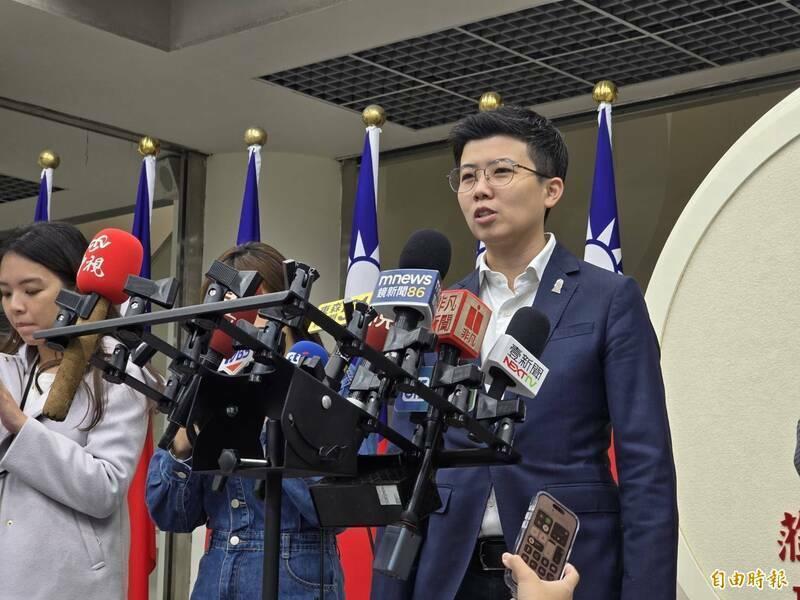The Taipei District Prosecutors’ Office today summoned a Taipei city councilor to testify about whether former Taipei Mayor Ko Wen-je (柯文哲) knowingly violated the law during his tenure regarding the Core Pacific City Co (京華城) project.
Prosecutors cited Taipei City Councilor Miao Po-ya’s (苗博雅) comments from Nov. 11, 2020, when she questioned then-mayor Ko regarding the treatment given to the Core Pacific City project after it was granted an increased floor area ratio.
The incentives the company received “had no legal basis,” Miao said at the time, citing that it received funds earmarked for urban renewal projects when it was neither an old or dangerous building.

Photo: Taipei Times file photo
In an interview yesterday, Miao said that she would answer all questions from both prosecutors’ and defendants’ lawyers truthfully, adding that as a legal professional she knows that testifying is part of a citizen’s obligations.
She is to face questions from prosecutors as well as lawyers representing defendants Ko, Taipei City Councilor Angela Ying (應曉薇) and Sheen Ching-jing (沈慶京), founder and chairman of the real-estate conglomerate Core Pacific Group.
The three defendants, as well as Ko’s former mayoral office head Lee Wen-tsung (李文宗), are all currently being held incommunicado, although the detention period is set to expire shortly.
Miao’s testimony would play a role in whether the four are released or remain in detention.
At the heart of the corruption case are allegations that the extra floor area ratio granted to Core Pacific Group allowed it to derive extra financial gains of more than NT$40 billion (US$1.25 billion).
Increased floor area ratio is usually granted as an incentive in urban renewal projects to permit more floor area, but usually at 130 to 150 percent.
The floor area ratio is the ratio of a building's total floor area to the size of the parcel of land on which it is built.
The project in question allegedly saw the floor area ratio increase from 392 percent to 840 percent.

Taiwan has received more than US$70 million in royalties as of the end of last year from developing the F-16V jet as countries worldwide purchase or upgrade to this popular model, government and military officials said on Saturday. Taiwan funded the development of the F-16V jet and ended up the sole investor as other countries withdrew from the program. Now the F-16V is increasingly popular and countries must pay Taiwan a percentage in royalties when they purchase new F-16V aircraft or upgrade older F-16 models. The next five years are expected to be the peak for these royalties, with Taiwan potentially earning

STAY IN YOUR LANE: As the US and Israel attack Iran, the ministry has warned China not to overstep by including Taiwanese citizens in its evacuation orders The Ministry of Foreign Affairs (MOFA) yesterday rebuked a statement by China’s embassy in Israel that it would evacuate Taiwanese holders of Chinese travel documents from Israel amid the latter’s escalating conflict with Iran. Tensions have risen across the Middle East in the wake of US and Israeli airstrikes on Iran beginning Saturday. China subsequently issued an evacuation notice for its citizens. In a news release, the Chinese embassy in Israel said holders of “Taiwan compatriot permits (台胞證)” issued to Taiwanese nationals by Chinese authorities for travel to China — could register for evacuation to Egypt. In Taipei, the ministry yesterday said Taiwan

POSITIVE DEVELOPMENT: Japan and the US are expected to hold in-depth discussions on Taiwan-related issues during the meeting next month, Japanese sources said The holding of a Japan-US leaders’ meeting ahead of US President Donald Trump’s visit to China is positive news for Taiwan, former Japan-Taiwan Exchange Association representative Hiroyasu Izumi said yesterday. After the Liberal Democratic Party’s landslide victory in Japan’s House of Representatives election, Japanese Prime Minister Sanae Takaichi is scheduled to visit the US next month, where she is to meet with Trump ahead of the US president’s planned visit to China from March 31 to April 2 for a meeting with Chinese President Xi Jinping (習近平). Japan and the US are expected to hold in-depth discussions on Taiwan-related issues during the

‘LIKE-MINDED PARTNER’: Tako van Popta said it would be inappropriate to delay signing the deal with Taiwan because of China, adding he would promote the issue Canadian senators have stressed Taiwan’s importance for international trade and expressed enthusiasm for ensuring the Taiwan-Canada trade cooperation framework agreement is implemented this year. Representative to Canada Harry Tseng (曾厚仁) in an interview with the Central News Agency (CNA) said he was increasingly uneasy about Ottawa’s delays in signing the agreement, especially as Ottawa has warmed toward Beijing. There are “no negotiations left. Not only [is it] initialed, we have three versions of the text ready: English, French and Mandarin,” Tseng said. “That tells you how close we are to the final signature.” Tseng said that he hoped Canadian Prime Minister Mark Carney